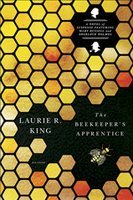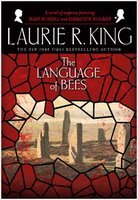 In a guest post on ReadingGroupGuides.com, Laurie R. King talked about the Virtual Book Club (VBC) on her website. Today Vicki VanValkenburgh, the administrator of the VBC, shares her story with us --- her lifelong love of reading, why she had to be
In a guest post on ReadingGroupGuides.com, Laurie R. King talked about the Virtual Book Club (VBC) on her website. Today Vicki VanValkenburgh, the administrator of the VBC, shares her story with us --- her lifelong love of reading, why she had to be  convinced to read Laurie's novel The Beekeeper's Apprentice and how she came to helm the online book club.
convinced to read Laurie's novel The Beekeeper's Apprentice and how she came to helm the online book club.The Beekeeper's Apprentice, Laurie R. King's first Mary Russell/Sherlock Holmes novel, is available as a free PDF download at TheBeeisFree.com until April 15th. It's part of "Fifteen Weeks of Bees," a celebration commemorating the 15th anniversary of the novel's publication. The next book in the series, The Lanfuage of Bees, arrives in store on April 28th.
When I tell people that I run an online book club for mystery author Laurie R. King, I usually get asked some variation on the question "How on earth did you fall into that?" I mean, it's not like being a lawyer (been there, done that), an accountant, a nurse or any of the more customary jobs, after all. The answer is specific to my own experience, but it reflects more generally the amazing power of the Internet to bring books, authors and readers together in a way that was never possible before.
But the Internet was not even on the horizon when I was born in 1966. Paper technology ruled the day, and I soon realized that those symbols the grown-ups peered at in books and newspapers meant something. And I wanted to know the secret of decoding them! After plowing through alphabet and phonetics sufficiently to crack the code, my life --- on a certain level --- really began.
I read everything I could get my hands on. If there wasn't a book, I'd read a magazine. If no magazine, then a newspaper. If no newspaper, I'd make do with the small print and lurid warnings of bug-spray cans from under the sink.
I read until the wee hours in the shaft of hall-light that fell across the end of my bed. I read with a book perched under my desk in class. I read in the car (motion sickness notwithstanding), and even in the bathtub, discovering that if you apply heavy rocks to a drenched library book, it tends to dry with pages that are about one-half as wavy as the pages in books left to dry on their own (if also somewhat harder to separate).
Books took me all over this world and to others as well. They took me to places in the past, present and future, to events real and imagined. But what I loved best about books were the wonderful people in them. Fierce, intelligent Jo March and her sisters; spoiled Mary Lennox and her equally insufferable and neglected cousin, who helped and healed each other by tending a secret garden; gawky, insecure Meg Murry and her brilliant little brother Charles Wallace, who leapt through dimensions on the backs of angels to save their father.
But there was always one thing missing in reading, and that was a sense of shared experience. Part of the fun of seeing a new movie, for instance, is comparing impressions, exchanging favorite scenes or quotes, getting a t-shirt and showing your support. Much of the allure in being a sports fan is in gathering with other fans to cheer on the team, wearing the team colors, doing The Wave.
There simply wasn't any equivalent in books for that sort of thing. I knew other book-mad kids, of course, but they usually liked different sorts of books, hadn't read my favorites, or had read them so long ago, their enthusiasm had dimmed over time. It was very disheartening. Even when I joined book groups as an adult, while I found stimulating discussions and books that stretched my reading muscles, I still never found exactly what I'd long found missing from the reading experience --- that contagious sense of enthusiasm and excitement about particular books.
But in the late 1990s, two things combined to create a seismic shift in my world. First, home Internet access became easier to obtain for technologically-challenged folks in flyover country, so I ordered my dial-up access and started finding my way around. Second, I read an article about a children's book series storming the country by way of little more than playground word-of-mouth. It featured a young orphan who discovers that he is a wizard and is whisked away from his horrible guardians to a wizarding school. The funny thing was, the article noted, parents were reading the books, too and even going online to talk about them with kids and other parents.
So I got the first two Harry Potter books, enjoyed them to bits, and went online looking to see what people were saying about them. One of the first sites I found was the Unofficial Harry Potter Fan Club (may it rest in peace) where there were hundreds of discussions on different aspects of the Harry Potter series --- spells, quidditch, character relationships and speculations about what would happen in future books.
And in a matter of moments, the Internet morphed in my mind from a place to shop, read the news, get email and find movie gossip to the sort of living, social extension of my reading life I'd wanted from the time I could stumble through a Dr. Suess book. It was my first real revelation of what the internet could make possible for readers.
One of the discussion threads I joined at the Harry Potter forum was based on Philip Pullman's fascinating His Dark Materials trilogy. The thread itself became a mini-community, and eventually its own forum, with a hundred or so kids and moms jabbering about HDM and other books.
In early 2001, we heard that Philip Pullman himself would be visiting a site called Readerville.com, a large community of book lovers, to talk about the HDM trilogy, and we flew over to join in the fun. There, I saw the power of connecting readers not only to other readers but also to their most beloved authors. For those of us who had never dreamed of talking to an author outside of the occasional book-signing, that was an astonishing thing.
After the Philip Pullman visit, many of us from the HDM forum stayed at Readerville and formed the core of what would become its Young Adult Reading Group. It grew to several hundred members, and we began voting on our monthly selections, with the authors of the chosen books invited to join.
It was about this time that several of the teens in the group started twisting my arm to read The Beekeeper's Apprentice. This was not something I wanted to do, given that I had a TBR skyscraper of books that I actually wanted to read. I reasoned with them: I hate bugs, I said, especially the ones that sting. I's not really about bees, they said. I don't read mysteries, I said --- if somebody's murdered, call the cops and leave me out of it. You'll like it anyway, they said. Sherlock Holmes is in it, I said. Sherlock Holmes is a jerk. No, he's wonderful, they said, guaranteeing that I'd like him before the first chapter was done. I'm so behind on my other books, I said. Just try one chapter, they said.
So I did --- and was absolutely hooked from page one by the story of young Mary Russell and her mentor, Sherlock Holmes. I didn't stop reading until I had to get the kids ready for school the next morning. That night, I went out and bought the rest of the series and read them all in every available second I had free, after which I was a staggering, sleep-deprived, but very happy biblio-zombie.
In Russell, I met another literary orphan who, like Harry Potter, burst forth fully formed from the author's head, with her own scars, insecurities and even her own horrible guardian. And as Harry does at Hogwarts, she finds a form of salvation and escape through her training with Holmes, training that develops her brilliant mind and enormous abilities, putting them to good use. And also like Harry, Mary Russell would have an impact on my own journey.
When The Beekeeper's Apprentice was chosen as a monthly selection, we invited the author, Laurie R. King, to participate. She did so, and was an outstanding guest, offering thoughtful and and informative answers to questions, keeping everyone laughing and involved, and even fending off a Sherlockian heckler with good-natured aplomb.
Several years later, Laurie emailed me to see if I might be interested in running a book club on her site, as I'd helped lead the discussion she visited at Readerville. Being in a transitional phase of sorts at the time, I jumped at the chance. And the Laurie R. King Virtual Book Club was formed, bringing together Laurie's readers from all over the world to discuss her books and many others. We have a wonderful time talking online and even have real-life meetups at events like Bouchercon and Left Coast Crime.
And it's funny, but when we get together, it really is like we've known each other for years and years --- even if we've never met face to face. There is a spirit of kinship and community that comes not only from being readers, I think, but also from what draws us to Laurie's writing --- a good sense of humor, curiosity, an appreciation for intelligence, learning, history and ideas, as well as a sense of adventure and of being part of a bigger world. They are "my people" in a fundamental way that is rare to find in any group.
I feel lucky not only because I'm alive in a time when this kind of community is possible, but also because I know what it's like not to have such an amazing ability to connect with other readers and authors. Because of that, I don't think I'll ever take it for granted --- I'll always have a little piece of the wonder I experienced the first time I visited that Harry Potter forum and realized that the walls between readers were gone. That if I wanted to talk about a favorite book, author or character, it was likely that I might never have to go wanting again. And as icing on the cake, I can finally have those bookish t-shirts I always wanted!
Do any of you have online book groups that have had a big impact on you or changed your life? I'd be interested to hear some of your stories, too.
---Vicki VanValkenburgh

